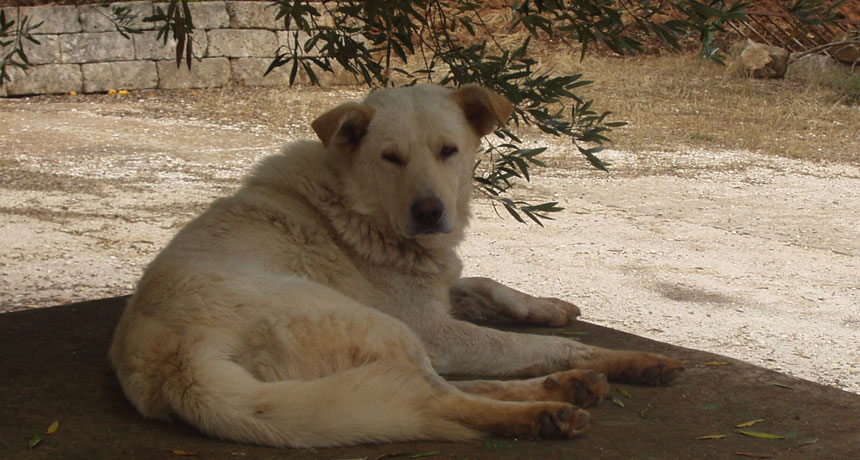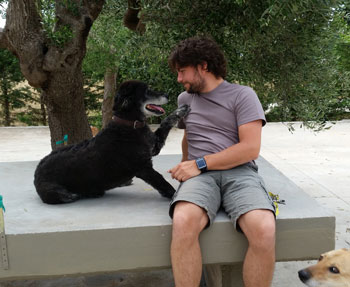Do dogs have a sense of self?
A ‘sniff test’ suggests they do

Lucky, one of the dogs that Gatti tested, recognizes itself not by looks but by scent.
Roberto Cazzolla Gatti
When Spot answers to his name, does he realize that this name is his? Maybe he only knows that it’s a good idea to come when he hears “Spot” because he might get a treat. People know their names and realize that they exist separately from other people. Many have wondered what other animals share this type of self-awareness. A new study now suggests that dogs are aware of who they are. Their nose knows.
Psychologists are scientists that study the mind. And they have a clever way to test for self-awareness in people. A researcher might place a mark on a child’s forehead while he or she is sleeping — and unaware. When the child wakes, the researcher then asks the child to look into a mirror. If the child touches the mark on his or her own face after seeing the mark in the mirror, then he or she has passed the test. Touching the mark shows that the child understands: “The child in the mirror is me.”
Most children over the age of three pass the test. One Asian elephant has too, as have some dolphins, chimpanzees and magpies (a type of bird).
Dogs, however, fail. They sniff the mirror or urinate on it. But they ignore the mark. This does not mean, however, that they are not self-aware, argues Roberto Cazzolla Gatti. As an ethologist (Ee-THOL-uh-gist), he studies animal behavior at Tomsk State University in Russia. He says the mirror test is just not the right tool to test self-awareness in dogs.
What is the main sense they use?” he asks. “It’s not the eyes. They use the nose to do almost everything.” So Gatti developed a “sniff test” for self-awareness.

To test that, Gatti used four dogs of different genders and ages. All had lived together in the same outdoor space for most of their lives. To get ready for the test, Gatti soaked up urine from each animal with pieces of cotton. He then placed each piece of cotton into a separate container. And Gatti kept them sealed so the urine’s scent would stay fresh.
He then set five of the containers randomly on the ground. Four held smelly cotton from each of the dogs. The fifth held clean cotton. It would serve as a control.
After opening the containers, Gatti released one dog into the area by itself. He timed how long it spent sniffing each container. He repeated this with each of the other three dogs alone — and then again when all four dogs were out roaming at the same time. For each new test, he replaced the used containers with fresh ones.
As he had suspected, each dog spent much less time sniffing its own urine. The animals often ignored that container entirely. Clearly, Gatti says, they passed the smell test. “If they recognize that this smell is mine” he explains, “then in some way they know what is ‘mine.’” And, he argues, if dogs understand the concept of “mine,” then they are self-aware.
His findings appear in the November 2015 issue of Ethology Ecology & Evolution.
Just like dogs in America
Gatti was not the first to try a smell test with dogs. Marc Bekoff, an ethologist at the University of Colorado in Boulder, did a similar experiment. He conducted these tests with his own dog, Jethro, between 1995 and 2000. During the winters, Bekoff would pick up patches of yellow snow where his dog or others had urinated. After moving these samples down the trail, he would time how long Jethro spent sniffing each patch of peed-upon snow. “People around Boulder thought I was incredibly odd,” he recalls.
Like Gatti’s dogs, Jethro spent less time — or no time at all — sniffing his own pee. While this behavior indicates he is self-aware, Bekoff hesitates to say that it means his dog has a deeper sense of self. For instance, he isn’t sure that his dog thinks of himself as a creature named Jethro. “Do dogs have that deep sense?” he asks. “My answer is: ‘I don’t know.’”
Gatti learned about Bekoff’s research only after his tests were done and he was writing up his results. He was both surprised and pleased to discover that two people in very different parts of the world had thought to test dogs for self-awareness using smell instead of sight.
Ethologists almost always use the same methods no matter what type of animal they’re testing, Gatti explains. But “a visual test doesn’t apply to every life form.” The important take-away, he says, is that different animals have different ways of experiencing the world. And scientists, he adds, need to account for that.
Tests for self-awareness do more than just satisfy people’s curiosity about animals, Bekoff says. If scientists learn that dogs and other non-primate animals are definitely self-aware, he adds, then laws might have to change to give those animals more protection or even legal rights.
Power Words
(for more about Power Words, click here)
behavior The way a person or other organism acts towards others, or conducts itself.
control A part of an experiment where there is no change from normal conditions. The control is essential to scientific experiments. It shows that any new effect is likely due only to the part of the test that a researcher has altered. For example, if scientists were testing different types of fertilizer in a garden, they would want one section of it to remain unfertilized, as the control. Its area would show how plants in this garden grow under normal conditions. And that give scientists something against which they can compare their experimental data.
ethology The science of behavior in animals, including humans, from a biological point of view. Scientists who work in this field are called ethologists.
pee A slang term for urine or the release of urine from the body.
primate The order of mammals that includes humans, apes, monkeys and related animals (such as tarsiers, the Daubentonia and other lemurs).
psychology The study of the human mind, especially in relation to actions and behavior. To do this, some perform research using animals. Scientists and mental-health professionals who work in this field are known as psychologists.
self-awareness knowledge of one’s own body or mind.







